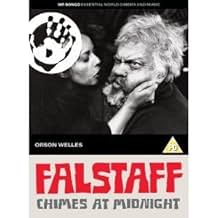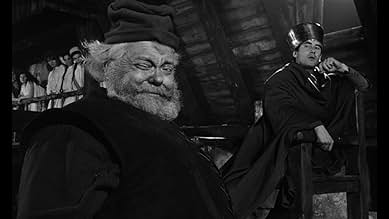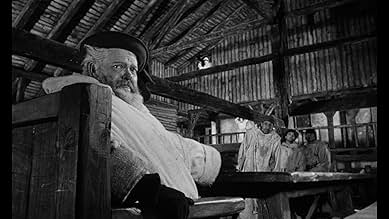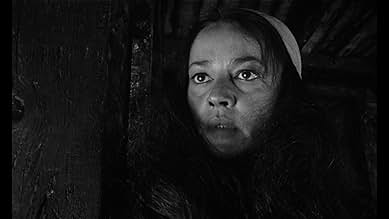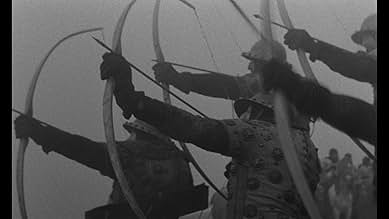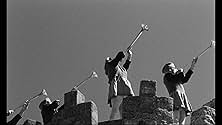ÉVALUATION IMDb
7,6/10
11 k
MA NOTE
La carrière du Sir John Falstaff de Shakespeare, tonitruant compagnon du jeune Prince Hal, aux alentours de 1400-1413.La carrière du Sir John Falstaff de Shakespeare, tonitruant compagnon du jeune Prince Hal, aux alentours de 1400-1413.La carrière du Sir John Falstaff de Shakespeare, tonitruant compagnon du jeune Prince Hal, aux alentours de 1400-1413.
- Director
- Writers
- Stars
- Nominé pour le prix 1 BAFTA Award
- 3 victoires et 2 nominations au total
Michael Aldridge
- Pistol
- (as Michael Aldrich)
Andrés Mejuto
- Woman's Tailor
- (as Andres Mejuto)
José Nieto
- Northumberland
- (as Jose Nieto)
Avis en vedette
10ednlaura
This is one of the great Shakespearean adaptations and a true 'lost classic'. It's also the last masterpiece that Orson Welles directed in his lifetime, and with 'Citizen Kane,' 'Magnificent Ambersons' and 'Touch of Evil' comprises a quartet of major cinematic works that he accomplished.
The film is an inventive re-editing and condensation of Shakespeare's plays, spanning from the end of Richard II to the beginning of Henry V. The film focuses on the character of Jack Falstaff, played by Welles himself in a virtuoso performance. Falstaff's relationship with young Prince Hal (later Henry V) is explored, and uncannily parallels Welles' own experience with the young talents of Hollywood.
Chimes at Midnight can be a jarring experience due to inconsistent film quality, low budget sets and Welles' flair for shock cuts, but it's a truly rewarding experience once you adapt to the style and limitations.
There are several great performances, by John Gielgud as Henry IV, Keith Baxter as Hal and Norman Rodway as Hotspur, who seems like a predecessor to Kenneth Branagh.
Chimes at Midnight has a little of everything: low comedy, highly artistic camera angles, exciting battle scenes (the battle of Shrewesbury scene influenced Braveheart) and a deeply moving story that Welles has 'discovered' between the lines of Shakespeare's histories.
The film is an inventive re-editing and condensation of Shakespeare's plays, spanning from the end of Richard II to the beginning of Henry V. The film focuses on the character of Jack Falstaff, played by Welles himself in a virtuoso performance. Falstaff's relationship with young Prince Hal (later Henry V) is explored, and uncannily parallels Welles' own experience with the young talents of Hollywood.
Chimes at Midnight can be a jarring experience due to inconsistent film quality, low budget sets and Welles' flair for shock cuts, but it's a truly rewarding experience once you adapt to the style and limitations.
There are several great performances, by John Gielgud as Henry IV, Keith Baxter as Hal and Norman Rodway as Hotspur, who seems like a predecessor to Kenneth Branagh.
Chimes at Midnight has a little of everything: low comedy, highly artistic camera angles, exciting battle scenes (the battle of Shrewesbury scene influenced Braveheart) and a deeply moving story that Welles has 'discovered' between the lines of Shakespeare's histories.
This is all more of a fascinating and compelling film because of its difficult-to-find nature, and the feeling of its being neglected, despite much praise from film and Welles scholars. This forms part of the compelling sequence of Welles films that began with 1958's "Touch of Evil", and ran through to his final film, 1973's "F For Fake", a film I really want to see. The version I managed to locate of "Chimes..." revealed a film with, yes, some technical problems (the sound is a little poor, but I'd almost expected worse), and the feeling of being made on-the-hoof. But what a film it is! Certainly hitherto the finest and most moving Shakespeare film adaptation that I have seen; I was happy to be able to write on it for my recent University Tripos exam.
Welles is possibly not a perfect Falstaff - failing to some degree to capture the character's jovial humour - but he gives a good performance in a limited, but powerfully melancholy vein. Keith Baxter makes Hal very much his own, providing curious contrasts to both of his father figures. Gielgud is as sublime as ever, and his scenes are beautifully directed - one wouldn't know the problems Welles had in terms of actor availability, considering how effective the medium close camera-work is.
The poetry of the "Sleep" speech is absolutely overpowering in Gielgud's rendition, and his facial expressions, eyes cast in shadow, are perfectly haunting. The strength of his performance is crucial; Henry IV is thus very much a figure with dignity but guilt and a coldness matching the stone of his solitary court - brilliant use of some sort of cathedral. Margaret Rutherford and Tony Beckley certainly add a lot to the mix, as does the bizarrely ill-fitting Jeanne Moreau, that most French of actresses playing an English whore. The tenderness she feels for Falstaff is crucial in softening his character a bit; Moreau's bedraggled siren works as a necessary example of the femininity of the Tavern, as compared to the masculine world of battle and court that Falstaff is so lost in. What a striking actress she is here; piercing, soulful eyes, such lips and flowing dark hair. It is a skittish and perfect performance fitting in with Welles' fantasia of "Merrie England". That most of this was filmed in Spain conveys the sense of this as an artificial, beyond-reality dream of the Paradise Lost. The film can effectively be seen as Welles expressing his interest in Western society's mourning a lost golden age - in this case, "Merrie England", which Falstaff embodies. The rational and dulling technocracy of the future is suggested by the coldness of Gielgud and Baxter towards the end, and the atmosphere of court.
The actor playing Justice Shallow is supremely odd and bewitching in his shrill little voice; his blustering humour and reminiscence taking on much melancholy as the film moves inexorably towards its tragic, deathly close. The scene where Falstaff finds out Hal is now King, is wonderfully shown in long shot by a still camera; a depression and drift towards disillusion shown. When Falstaff finds out, the lift in spirits is conveyed with his movement towards the camera. It's a return to the general sense of camera mobility around Falstaff - contrasting with the stillness around Bolingbroke. The final rejection of Falstaff that follows is beautifully filmed by Welles, played ambiguously by Baxter and movingly by Welles.
What must be the most remarkable sequence is the Battle of Shrewsbury; it is this that will haunt the mind long into the ether... Savage, indiscriminate quickness of brutal death emphasised in quick cuts. The fighting is impersonal and grimly realistic; ranks of silhouetted men and horses charging in, arrows - unlike in Olivier's "Henry V" - being shown cascading into and piercing ranks of horses and soldiers. The dry ground dissolves gradually to mud, and a haunting, holy-sounding piece of choral music strikes a chilling note of ironic contrast. Mankind has been reduced by war back to the very mud from which it originally arose. All sense of 'glory' is dissipated and cut away, by this frightening, near-ten minute sequence. It is one of the most gripping, utterly transcendent and powerful sequences I have seen in the whole of my film viewing.
"Chimes at Midnight" is a marvel of a film; this is a Welles film in its true form and not tampered with - "The Magnificent Ambersons" is the most shameful previous example of this. "Chimes..." stands as a complex masterpiece; partly an elegy for an innocence than may never have truly existed, but which Welles *feels* deeply. Track this down if you can as it is something special; let's hope it is soon restored to the best possible condition. It is wonderfully slanted Shakespeare; history plays fashioned into a tragedy, and painted from the most compelling cinematic palette. And above all, it is wonderful Welles.
Welles is possibly not a perfect Falstaff - failing to some degree to capture the character's jovial humour - but he gives a good performance in a limited, but powerfully melancholy vein. Keith Baxter makes Hal very much his own, providing curious contrasts to both of his father figures. Gielgud is as sublime as ever, and his scenes are beautifully directed - one wouldn't know the problems Welles had in terms of actor availability, considering how effective the medium close camera-work is.
The poetry of the "Sleep" speech is absolutely overpowering in Gielgud's rendition, and his facial expressions, eyes cast in shadow, are perfectly haunting. The strength of his performance is crucial; Henry IV is thus very much a figure with dignity but guilt and a coldness matching the stone of his solitary court - brilliant use of some sort of cathedral. Margaret Rutherford and Tony Beckley certainly add a lot to the mix, as does the bizarrely ill-fitting Jeanne Moreau, that most French of actresses playing an English whore. The tenderness she feels for Falstaff is crucial in softening his character a bit; Moreau's bedraggled siren works as a necessary example of the femininity of the Tavern, as compared to the masculine world of battle and court that Falstaff is so lost in. What a striking actress she is here; piercing, soulful eyes, such lips and flowing dark hair. It is a skittish and perfect performance fitting in with Welles' fantasia of "Merrie England". That most of this was filmed in Spain conveys the sense of this as an artificial, beyond-reality dream of the Paradise Lost. The film can effectively be seen as Welles expressing his interest in Western society's mourning a lost golden age - in this case, "Merrie England", which Falstaff embodies. The rational and dulling technocracy of the future is suggested by the coldness of Gielgud and Baxter towards the end, and the atmosphere of court.
The actor playing Justice Shallow is supremely odd and bewitching in his shrill little voice; his blustering humour and reminiscence taking on much melancholy as the film moves inexorably towards its tragic, deathly close. The scene where Falstaff finds out Hal is now King, is wonderfully shown in long shot by a still camera; a depression and drift towards disillusion shown. When Falstaff finds out, the lift in spirits is conveyed with his movement towards the camera. It's a return to the general sense of camera mobility around Falstaff - contrasting with the stillness around Bolingbroke. The final rejection of Falstaff that follows is beautifully filmed by Welles, played ambiguously by Baxter and movingly by Welles.
What must be the most remarkable sequence is the Battle of Shrewsbury; it is this that will haunt the mind long into the ether... Savage, indiscriminate quickness of brutal death emphasised in quick cuts. The fighting is impersonal and grimly realistic; ranks of silhouetted men and horses charging in, arrows - unlike in Olivier's "Henry V" - being shown cascading into and piercing ranks of horses and soldiers. The dry ground dissolves gradually to mud, and a haunting, holy-sounding piece of choral music strikes a chilling note of ironic contrast. Mankind has been reduced by war back to the very mud from which it originally arose. All sense of 'glory' is dissipated and cut away, by this frightening, near-ten minute sequence. It is one of the most gripping, utterly transcendent and powerful sequences I have seen in the whole of my film viewing.
"Chimes at Midnight" is a marvel of a film; this is a Welles film in its true form and not tampered with - "The Magnificent Ambersons" is the most shameful previous example of this. "Chimes..." stands as a complex masterpiece; partly an elegy for an innocence than may never have truly existed, but which Welles *feels* deeply. Track this down if you can as it is something special; let's hope it is soon restored to the best possible condition. It is wonderfully slanted Shakespeare; history plays fashioned into a tragedy, and painted from the most compelling cinematic palette. And above all, it is wonderful Welles.
What can be said about Chimes at Midnight that hasn't already been said? Orson Welles' ode to Fallstaff, a part that Shakespeare obviously created with Welles' himself in mind, seems to be the perfect culmination of his enormous (no pun intended) career. The meager budget of the film is only reflected in the bad dubbing & sound quality, which is still glaring despite restoration efforts. Welles makes up for this in film noir lit faces, intense battle scenes, and of course, his impeccable acting & connection with the character. With the minute movement of his eye, he can garner laughter or sympathy. While we may be used to chuckling at Falstaff's bumbling, brazen arrogance, Welles also brings us, in the end, to profoundly feel the anguish that lies at the depths of Falstaff's soul. His performance seems to be a psychological study on fatherly influences, quite probably pulling from his experiences with his own Fallstaffian father, among others. Having recently watched My Own Private Idaho, it is hard not to make comparisons & observe the obvious inspiration Gus Van Sant drew from Chimes for his quintessential film. It was also interesting to watch the dramatic battle scenes, which on a shoestring budget are very cleverly shot & edited to feel big budget. This film has probably inspired many larger budget Shakespearean, war & movies in other genres, and yet stands in a league of its own.
(Flash Review)
Very rarely has a voice been so perfectly matched to the poetic genre of Shakespeare. His deep and rich voice bellows out lines with great authority and emotion. I have a strong dislike for Shakespeare as I've never been able to fully comprehend the dialog. But this was an Orson film so I gave it my time and was rewarded by well-composed shot framing and interesting camera angles as well as his distinctive voice. The plot was about the betrayal of friendship and revolves around kings and people ascending to power while some get left behind. Great acting, a meaty story and if you like both Shakespeare and Orson Welles, don't miss it.
Very rarely has a voice been so perfectly matched to the poetic genre of Shakespeare. His deep and rich voice bellows out lines with great authority and emotion. I have a strong dislike for Shakespeare as I've never been able to fully comprehend the dialog. But this was an Orson film so I gave it my time and was rewarded by well-composed shot framing and interesting camera angles as well as his distinctive voice. The plot was about the betrayal of friendship and revolves around kings and people ascending to power while some get left behind. Great acting, a meaty story and if you like both Shakespeare and Orson Welles, don't miss it.
Shakespeare Scholars are always complaining how this film used and abused Shakespeare's plays but I think what was done in this film was pretty clever: Take the character of Falstaff from several plays and piece them together to get a complete picture of the man.
Of the two Orson Welles Shakespeare films I've seen, this one and "Othello" (1954), both had the ability to make me want to read Shakespeare's plays and any film that makes you want to read what the author wrote is a very positive thing to say about a film. So there Shakespeare Scholars!
I did go out and buy the books with the plays used in this film, much like trying to solve a puzzle to see how the pieces really fit. And Orson did twist and bend things a little to make it come out his way.
I also read in Videohound's "World Cinema" (1999) by Elliot Wilhelm that this film may be getting a restoration. If it's as good a restoration as "Othello", I'm looking forward to it!
Welles as Falstaff really shines in this film and Falstaff's later rejection by Henry V is one of the most sobering in cinema. And Welles still has some very creative power left in him by 1965, look at the Battle of Shrewsbury scenes. When it comes to battle scenes they've been done probably only 10 different ways by 1000 directors in a 1000 movies over the years, but this one is probably the most memorable. It's also strange to have in the heat of battle Falstaff looking like a big metal beach ball running around back and forth trying to avoid any conflict.
This film is also a good example of good music and how to use it in a film and it's another one of my favorite movies about Merrie ol' England.
Of the two Orson Welles Shakespeare films I've seen, this one and "Othello" (1954), both had the ability to make me want to read Shakespeare's plays and any film that makes you want to read what the author wrote is a very positive thing to say about a film. So there Shakespeare Scholars!
I did go out and buy the books with the plays used in this film, much like trying to solve a puzzle to see how the pieces really fit. And Orson did twist and bend things a little to make it come out his way.
I also read in Videohound's "World Cinema" (1999) by Elliot Wilhelm that this film may be getting a restoration. If it's as good a restoration as "Othello", I'm looking forward to it!
Welles as Falstaff really shines in this film and Falstaff's later rejection by Henry V is one of the most sobering in cinema. And Welles still has some very creative power left in him by 1965, look at the Battle of Shrewsbury scenes. When it comes to battle scenes they've been done probably only 10 different ways by 1000 directors in a 1000 movies over the years, but this one is probably the most memorable. It's also strange to have in the heat of battle Falstaff looking like a big metal beach ball running around back and forth trying to avoid any conflict.
This film is also a good example of good music and how to use it in a film and it's another one of my favorite movies about Merrie ol' England.
Le saviez-vous
- AnecdotesDespite portraying Falstaff as a grossly obese man, Orson Welles actually had to diet to slim down for the role.
- GaffesThe corpse of Hotspur opens and closes his mouth several minutes after his death.
- ConnexionsFeatured in The 43rd Annual Academy Awards (1971)
Meilleurs choix
Connectez-vous pour évaluer et surveiller les recommandations personnalisées
- How long is Chimes at Midnight?Propulsé par Alexa
Détails
- Date de sortie
- Pays d’origine
- Langue
- Aussi connu sous le nom de
- Chimes at Midnight
- Lieux de tournage
- Calatañazor, Soria, Castilla y León, Espagne(London streets scenes)
- sociétés de production
- Consultez plus de crédits d'entreprise sur IMDbPro
Box-office
- Budget
- 800 000 $ US (estimation)
- Brut – États-Unis et Canada
- 126 724 $ US
- Fin de semaine d'ouverture – États-Unis et Canada
- 13 630 $ US
- 3 janv. 2016
- Brut – à l'échelle mondiale
- 126 724 $ US
- Durée
- 1h 59m(119 min)
- Couleur
- Mixage
- Rapport de forme
- 1.66 : 1
Contribuer à cette page
Suggérer une modification ou ajouter du contenu manquant



